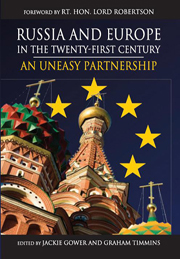Book contents
- Frontmatter
- Contents
- List of Contributors
- Acknowledgements
- List of Abbreviations/Acronyms
- Foreword Russia and Europe
- Preface
- Introduction Russia and Europe: What Kind of Partnership?
- PART 1 Russia looking West
- PART 2 Europe looking East
- PART 3 Partnership in Practice
- Conclusion Russia and Europe: An Uneasy Partnership 289
- Index
- More Titles in this series
Conclusion Russia and Europe: An Uneasy Partnership 289
Published online by Cambridge University Press: 05 March 2012
- Frontmatter
- Contents
- List of Contributors
- Acknowledgements
- List of Abbreviations/Acronyms
- Foreword Russia and Europe
- Preface
- Introduction Russia and Europe: What Kind of Partnership?
- PART 1 Russia looking West
- PART 2 Europe looking East
- PART 3 Partnership in Practice
- Conclusion Russia and Europe: An Uneasy Partnership 289
- Index
- More Titles in this series
Summary
Mutual Disappointment
One of the main objectives of the book was to examine the current state of Russia's relations with Europe from the perspective of both parties since the long-term prospects of any relationship must depend on meeting the needs of all those involved. What is particularly striking is the level of disappointment on all sides about what has actually been achieved over the past 15 years. There have certainly been a number of apparent breakthroughs in the development of a genuinely strategic partnership such as the NATO-Russia Founding Act in May 1997, the coming into force of the Partnership and Cooperation Agreement (PCA) in November 1997, the adoption of the European Union (EU)'s Common Strategy and Russia's Medium-Term Strategy in 1999, the establishment of the NATO-Russia Council (NRC) in 2002, the commitment to the four common spaces at St Petersburg in 2003 and the adoption of the road maps in 2005. However, the optimism and high expectations generated by such initiatives rapidly gave way to frustration at the slow progress being made in translating the ambitious goals into concrete achievements. It is clear that neither Russia nor Europe are satisfied with the current state of their partnership and both feel that the other has not lived up to their expectations.
From Russia's perspective, the West has provided only meagre aid to support its economic transition and been slow to open up its markets, either through the EU or the World Trade Organization (WTO).
- Type
- Chapter
- Information
- Russia and Europe in the Twenty-First CenturyAn Uneasy Partnership, pp. 289 - 300Publisher: Anthem PressPrint publication year: 2007

